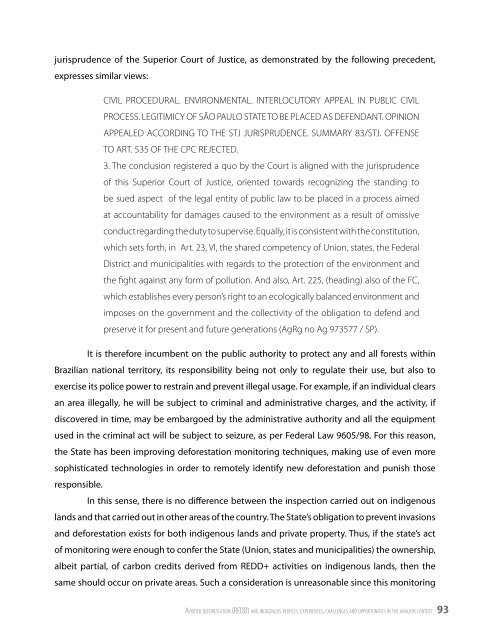Avoided Deforestation (REDD) and Indigenous ... - Amazon Fund
Avoided Deforestation (REDD) and Indigenous ... - Amazon Fund
Avoided Deforestation (REDD) and Indigenous ... - Amazon Fund
Create successful ePaper yourself
Turn your PDF publications into a flip-book with our unique Google optimized e-Paper software.
jurisprudence of the Superior Court of Justice, as demonstrated by the following precedent,<br />
expresses similar views:<br />
CIVIL PROCEDURAL. ENVIRONMENTAL. INTERLOCUTORY APPEAL IN PUBLIC CIVIL<br />
PROCESS. LEGITIMICY OF SÃO PAULO STATE TO BE PLACED AS DEFENDANT. OPINION<br />
APPEALED ACCORDING TO THE STJ JURISPRUDENCE. SUMMARY 83/STJ. OFFENSE<br />
TO ART. 535 OF THE CPC REJECTED.<br />
3. The conclusion registered a quo by the Court is aligned with the jurisprudence<br />
of this Superior Court of Justice, oriented towards recognizing the st<strong>and</strong>ing to<br />
be sued aspect of the legal entity of public law to be placed in a process aimed<br />
at accountability for damages caused to the environment as a result of omissive<br />
conduct regarding the duty to supervise. Equally, it is consistent with the constitution,<br />
which sets forth, in Art. 23, VI, the shared competency of Union, states, the Federal<br />
District <strong>and</strong> municipalities with regards to the protection of the environment <strong>and</strong><br />
the fight against any form of pollution. And also, Art. 225, (heading) also of the FC,<br />
which establishes every person’s right to an ecologically balanced environment <strong>and</strong><br />
imposes on the government <strong>and</strong> the collectivity of the obligation to defend <strong>and</strong><br />
preserve it for present <strong>and</strong> future generations (AgRg no Ag 973577 / SP).<br />
It is therefore incumbent on the public authority to protect any <strong>and</strong> all forests within<br />
Brazilian national territory, its responsibility being not only to regulate their use, but also to<br />
exercise its police power to restrain <strong>and</strong> prevent illegal usage. For example, if an individual clears<br />
an area illegally, he will be subject to criminal <strong>and</strong> administrative charges, <strong>and</strong> the activity, if<br />
discovered in time, may be embargoed by the administrative authority <strong>and</strong> all the equipment<br />
used in the criminal act will be subject to seizure, as per Federal Law 9605/98. For this reason,<br />
the State has been improving deforestation monitoring techniques, making use of even more<br />
sophisticated technologies in order to remotely identify new deforestation <strong>and</strong> punish those<br />
responsible.<br />
In this sense, there is no difference between the inspection carried out on indigenous<br />
l<strong>and</strong>s <strong>and</strong> that carried out in other areas of the country. The State’s obligation to prevent invasions<br />
<strong>and</strong> deforestation exists for both indigenous l<strong>and</strong>s <strong>and</strong> private property. Thus, if the state’s act<br />
of monitoring were enough to confer the State (Union, states <strong>and</strong> municipalities) the ownership,<br />
albeit partial, of carbon credits derived from <strong>REDD</strong>+ activities on indigenous l<strong>and</strong>s, then the<br />
same should occur on private areas. Such a consideration is unreasonable since this monitoring<br />
Av o i d e d d e f o re s t A t i o n (redd) A n d i n d i g e n o u s p e o p l e s: experiences, chAllenges A n d o p p o r t u n i t i e s in t h e A m A zo n c o n t e x t 93
















